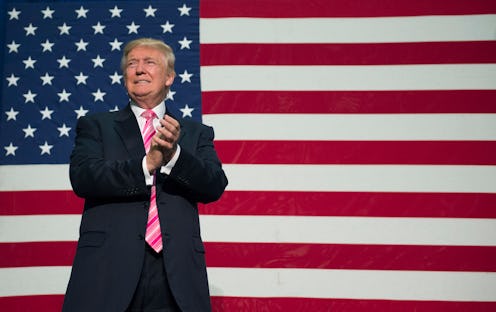News
Why Asian Americans Won't Vote Donald Trump
On Saturday evening, Donald Trump made another attempt to win the black vote. At a rally in Virginia, he made a pretty grand statement: "The GOP is the party of Abraham Lincoln, and I want our party to be the home of the African-American voter once again." Trump's speeches over the weekend can be read as an indication of change in his campaign and tone, but they are still ultimately meager efforts, since Democratic nominee Hillary Clinton continues to hold a significant dominance over him when it comes to minority groups in America. While there has been a lot of focus on how African-American and Hispanic voters will impact the election, the Asian-American vote has been overlooked and under-analyzed, writes Gerald F. Seib of The Wall Street Journal.
Trump does not have any significant support from the country's rapidly growing Asian-American population. Similarly to African-American and Hispanic voters, Trump is not polling well among the demographic. A survey by the Asian and Pacific Islander American Vote project, an organization which works to galvanize voting among Asians, found that a whopping 65 percent of Asian-Americans voters viewed Trump unfavorably. This isn't necessarily surprising — his anti-immigration rhetoric has clearly impacted his standing among diverse pockets of the American electorate. So what difference will the Asian-American vote make this election season?
Asian Americans have historically leaned more toward Democratic policies and ideologies, with a national poll cited by The Wall Street Journal finding a 12-point increase among Asian Americans identifying as Democrats from 2012. Currently, they don't constitute a dominant chunk of the electorate, as they make up about 4 percent of the eligible voting population. But recent research from the Pew Research Center indicates a shift in the long term. Immigration from Asia is rapidly overtaking arrivals from other countries, marking it a significant source of both economic and demographic change in the American population.
Asian immigrants have outnumbered Hispanic immigrants in the last five years. This is a big deal — the rapid influx is bound to have some kind of effect on American politics. But whether that effect is realized in this current election is still hard to say. As mentioned, Asian-Americans still represent a fairly small bracket of the population, but where their votes will matter the most depends largely on their share of the electorate in specific states.
According to data compiled by the Asian and Pacific Islander American Vote project, the impact of the Asian-American vote will be higher in key states based on their numbers. For example, they make up 15 percent of the electorate in California, 9 percent in Nevada, 7 percent in New Jersey, and 5 percent in Virginia. In the bigger picture, shifting immigration trends should concern Republicans, as the party doesn't poll well among minority groups in battleground states, and their votes can play a pretty decisive role in the end.
According to The LA Times back in May, there is, despite the overwhelming Democrat support among Asian voters, a group of Chinese-Americans who are vocal supporters of Trump. Many of these supporters are recent immigrants with strong nationalistic outlooks, including strict immigration control — all issues that Trump insists will "make America great again."
But what seems to frustrate the Republican party, as Seib writes, is the disconnect between Asian voters and the GOP message. Traditionally, with the GOP's entrepreneurial leanings, it can be reasonable to expect that the party would garner some significant support from immigrant populations, which have often staked their claims in the country through avenues of business and technology. And interestingly enough, another unlikely segment of the overall Asian population — Indian-Americans — has recently spoken out in favor of Trump.
As reported by Quartz, political committees like Indian Americans for Trump and Hindus for Trump are surprising examples of support among historically Democrat-supporting demographics. According to a 2014 Pew Research Center study, 65 percent of Indian Americans identified as Democrats. But it's important to note that while these political action committees are surprising, they are still an exception to the rule. Since most Indian-Americans live in big blue states, like New York and California, they majority of their vote will most likely be for the Democratic Party, as Sanjay Puri, the head of the U.S. India Political Action Committee, told Quartz.
Even though there are instances of support for Trump from minority groups, ultimately, it looks like Trump is most probably not going to be able to secure any kind of majority vote from minority groups in America. The election results are 78 days away, but the latest polls very clearly show an overall Clinton lead in national polls — 50 percent over his 42 percent.
